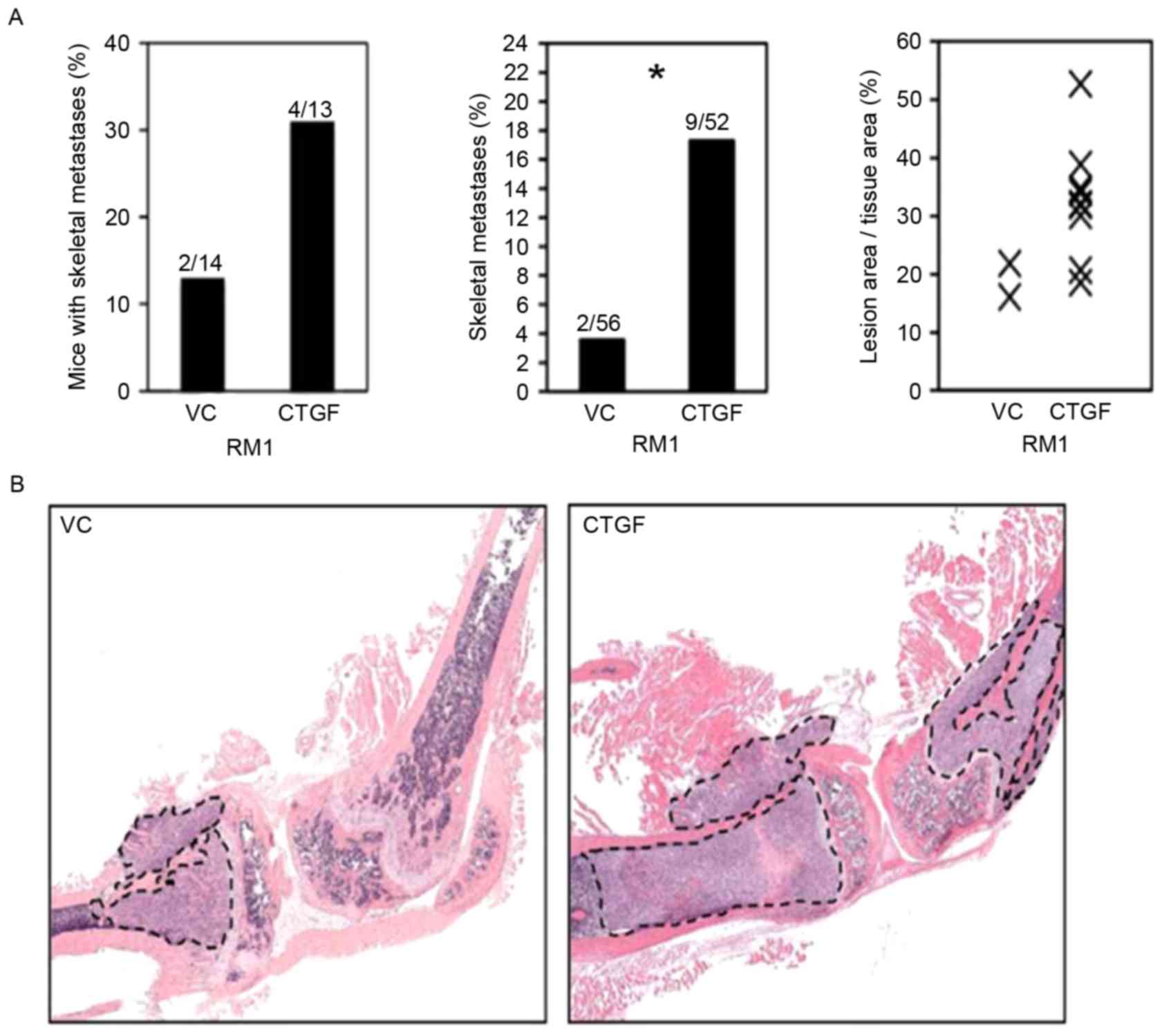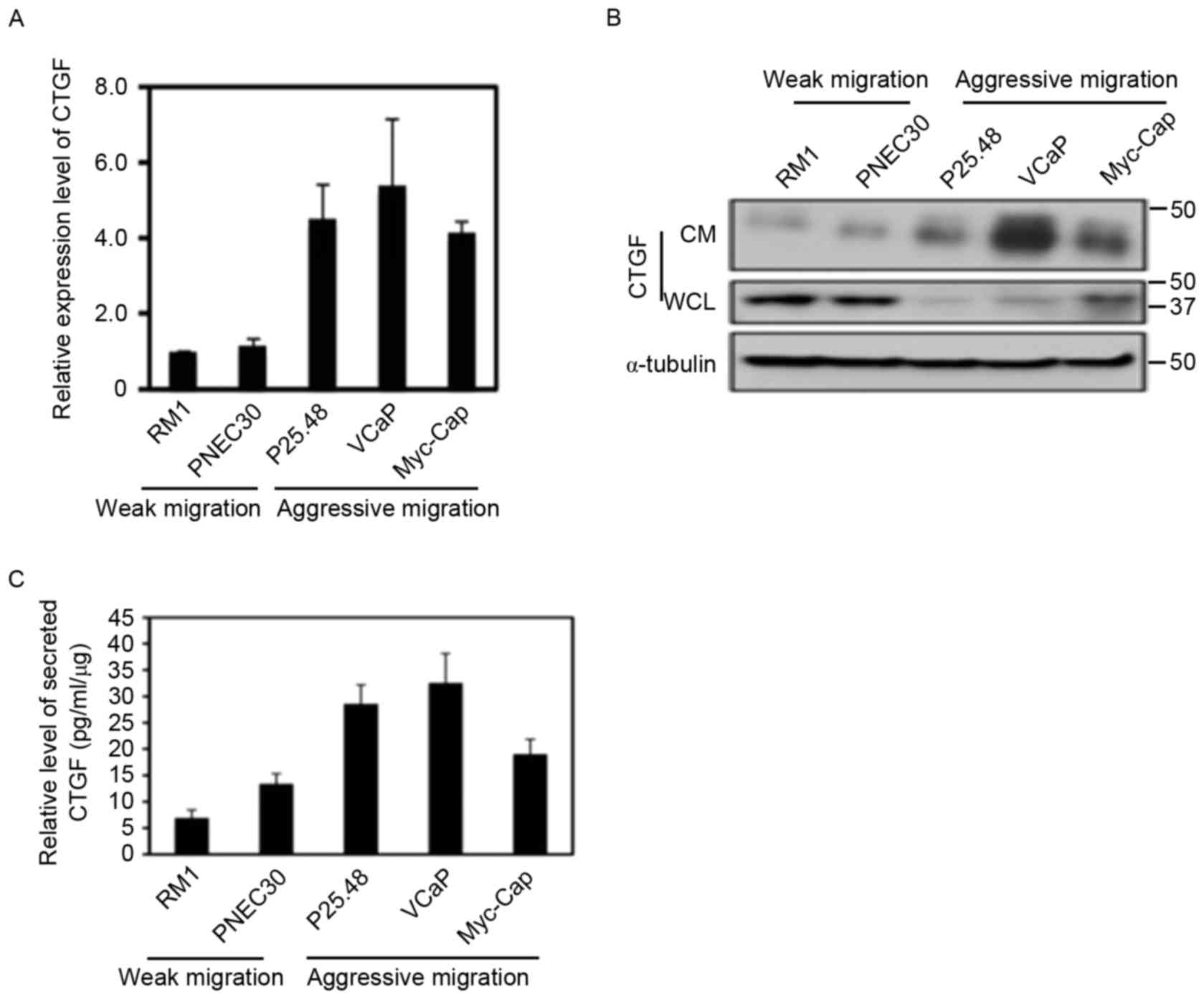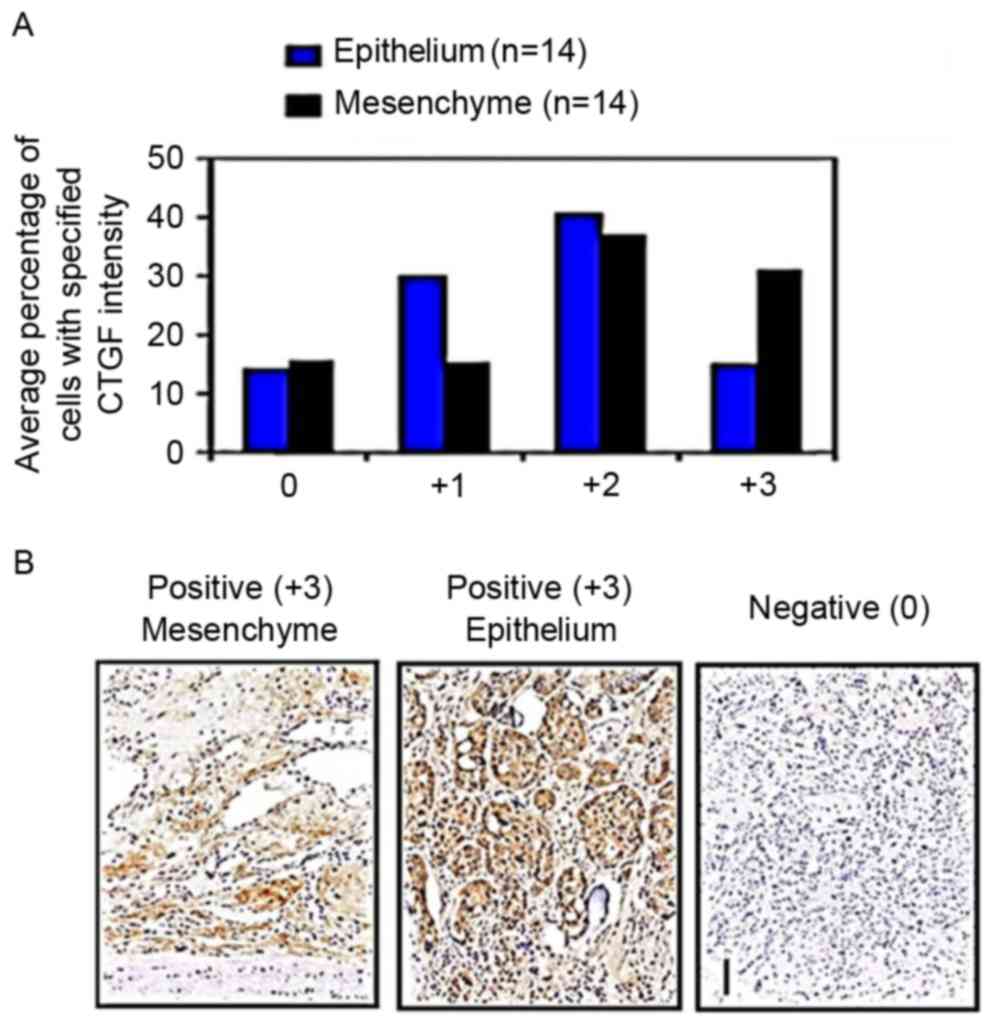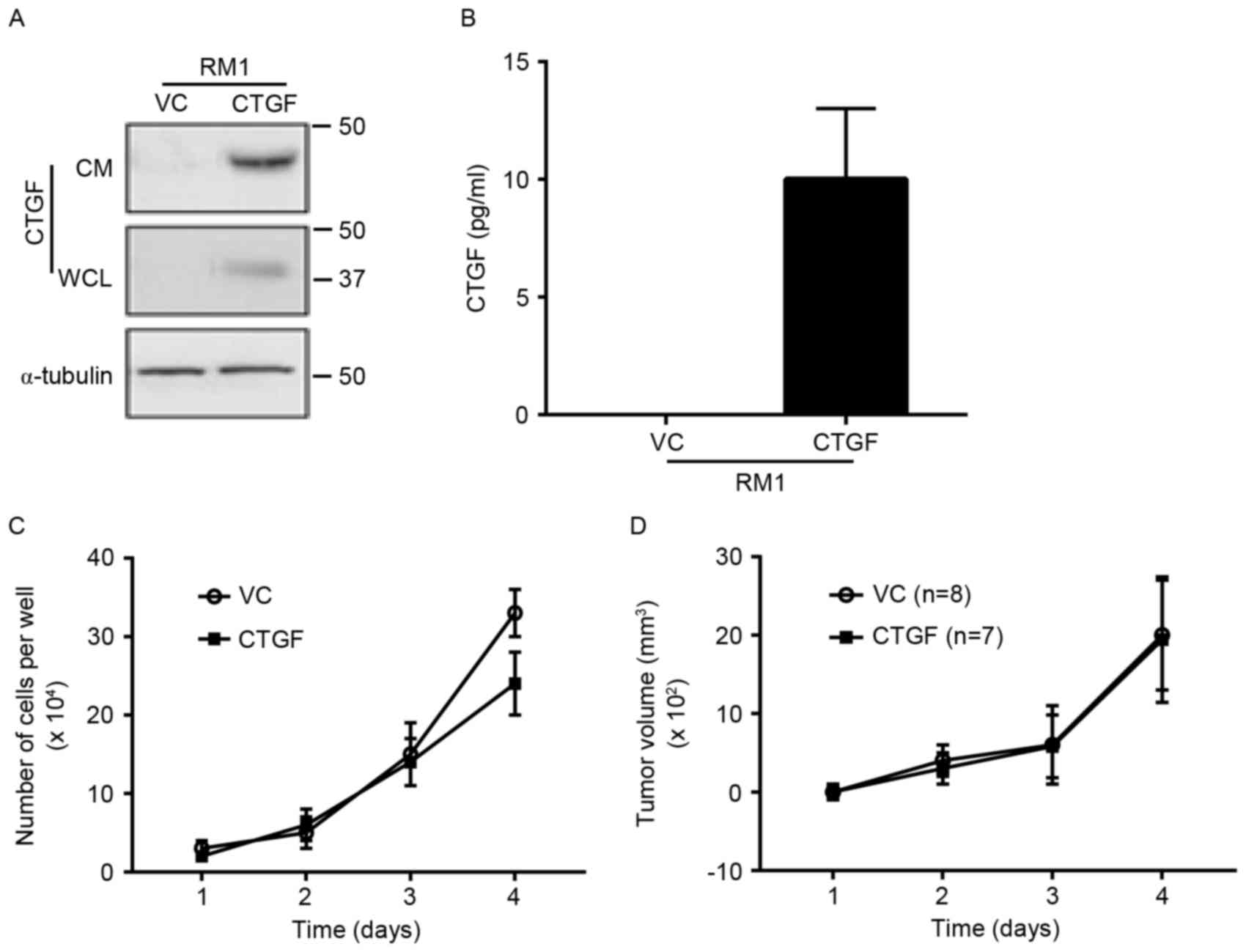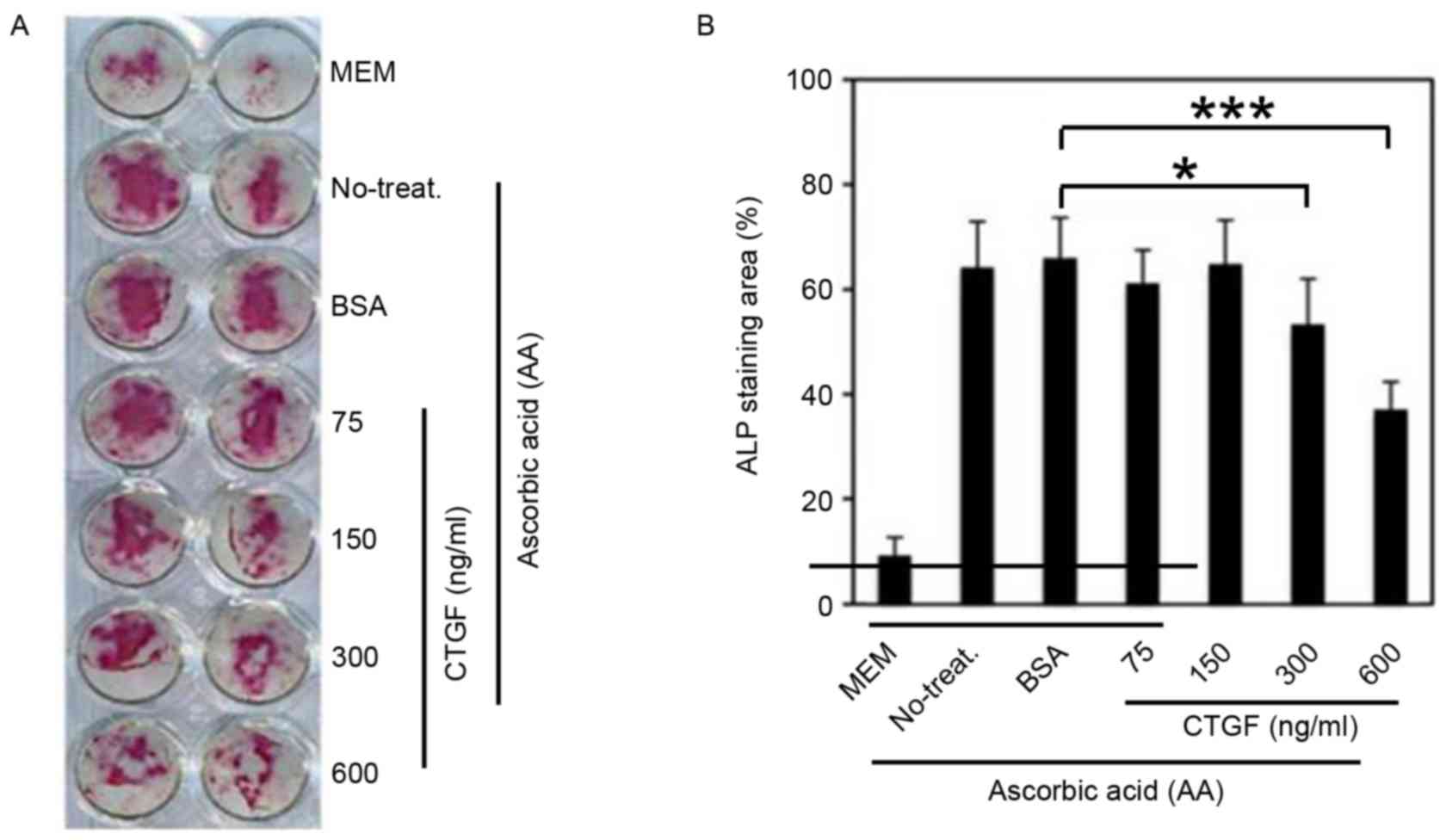|
1
|
Vickers AJ, Sjoberg DD, Ulmert D,
Vertosick E, Roobol MJ, Thompson I, Heijnsdijk EA, De Koning H,
Atoria-Swartz C, Scardino PT and Lilja H: Empirical estimates of
prostate cancer overdiagnosis by age and prostate-specific antigen.
BMC Med. 12:262014. View Article : Google Scholar : PubMed/NCBI
|
|
2
|
Cives M, Rizzo F, Simone V, Bisceglia F,
Stucci S, Seeber A, Spizzo G, Montrone T, Resta L and Silvestris F:
Reviewing the osteotropism in neuroendocrine tumors: The role of
epithelial-mesenchymal transition. Neuroendocrinology. 103:321–334.
2016. View Article : Google Scholar : PubMed/NCBI
|
|
3
|
Chen CC and Lau LF: Functions and
mechanisms of action of CCN matricellular proteins. Int J Biochem
Cell Biol. 41:771–783. 2009. View Article : Google Scholar : PubMed/NCBI
|
|
4
|
Holbourn KP, Acharya KR and Perbal B: The
CCN family of proteins: Structure-function relationships. Trends
Biochem Sci. 33:461–473. 2008. View Article : Google Scholar : PubMed/NCBI
|
|
5
|
Kubota S and Takigawa M: The role of CCN2
in cartilage and bone development. J Cell Commun Signal. 5:209–217.
2011. View Article : Google Scholar : PubMed/NCBI
|
|
6
|
Hou R, Wang YW, Liang HF, Zhang ZG, Liu
ZM, Zhang BH, Zhang BX and Chen XP: Animal and cellular models of
hepatocellular carcinoma bone metastasis: Establishment and
characterisation. J Cancer Res Clin Oncol. 141:1931–1943. 2015.
View Article : Google Scholar : PubMed/NCBI
|
|
7
|
Jun JI and Lau LF: Taking aim at the
extracellular matrix: CCN proteins as emerging therapeutic targets.
Nat Rev Drug Discov. 10:945–963. 2011. View
Article : Google Scholar : PubMed/NCBI
|
|
8
|
Tai HC, Chang AC, Yu HJ, Huang CY, Tsai
YC, Lai YW, Sun HL, Tang CH and Wang SW: Osteoblast-derived
WNT-induced secreted protein 1 increases VCAM-1 expression and
enhances prostate cancer metastasis by down-regulating miR-126.
Oncotarget. 5:7589–7598. 2014. View Article : Google Scholar : PubMed/NCBI
|
|
9
|
Ren L, Wang X, Dong Z, Liu J and Zhang S:
Bone metastasis from breast cancer involves elevated IL-11
expression and the gp130/STAT3 pathway. Med Oncol. 30:6342013.
View Article : Google Scholar : PubMed/NCBI
|
|
10
|
Gao YB, Xiang ZL, Zhou LY, Wu ZF, Fan J,
Zeng HY and Zeng ZC: Enhanced production of CTGF and IL-11 from
highly metastatic hepatoma cells under hypoxic conditions: An
implication of hepatocellular carcinoma metastasis to bone. J
Cancer Res Clin Oncol. 139:669–679. 2013. View Article : Google Scholar : PubMed/NCBI
|
|
11
|
Wang X, Sha L, Sun N, Shen Y and Xu Q:
Deletion of mTOR in reactive astrocytes suppresses chronic seizures
in a mouse model of temporal lobe epilepsy. Mol Neurobiol.
54:175–187. 2017. View Article : Google Scholar : PubMed/NCBI
|
|
12
|
Schmittgen TD and Livak KJ: Analyzing
real-time PCR data by the comparative C(T) method. Nat Protoc.
3:1101–1108. 2008. View Article : Google Scholar : PubMed/NCBI
|
|
13
|
Fischer AH, Jacobson KA, Rose J and Zeller
R: Hematoxylin and eosin staining of tissue and cell sections. CSH
Protoc. 2008:pdb.prot4986. 2008.
|
|
14
|
Juárez P, Mohammad KS, Yin JJ, Fournier
PG, McKenna RC, Davis HW, Peng XH, Niewolna M, Javelaud D, Chirgwin
JM, et al: Halofuginone inhibits the establishment and progression
of melanoma bone metastases. Cancer Res. 72:6247–6256. 2012.
View Article : Google Scholar : PubMed/NCBI
|
|
15
|
Chien W, O'Kelly J, Lu D, Leiter A, Sohn
J, Yin D, Karlan B, Vadgama J, Lyons KM and Koeffler HP: Expression
of connective tissue growth factor (CTGF/CCN2) in breast cancer
cells is associated with increased migration and angiogenesis. Int
J Oncol. 38:1741–1747. 2011.PubMed/NCBI
|
|
16
|
Cawthorn TR, Amir E, Broom R, Freedman O,
Gianfelice D, Barth D, Wang D, Holen I, Done SJ and Clemons M:
Mechanisms and pathways of bone metastasis: Challenges and pitfalls
of performing molecular research on patient samples. Clin Exp
Metastasis. 26:935–943. 2009. View Article : Google Scholar : PubMed/NCBI
|
|
17
|
Fong YC, Lin CY, Su YC, Chen WC, Tsai FJ,
Tsai CH, Huang CY and Tang CH: CCN6 enhances ICAM-1 expression and
cell motility in human chondrosarcoma cells. J Cell Physiol.
227:223–232. 2012. View Article : Google Scholar : PubMed/NCBI
|
|
18
|
Mohammad KS, Javelaud D, Fournier PG,
Niewolna M, McKenna CR, Peng XH, Duong V, Dunn LK, Mauviel A and
Guise TA: TGF-beta-RI kinase inhibitor SD-208 reduces the
development and progression of melanoma bone metastases. Cancer
Res. 71:175–184. 2011. View Article : Google Scholar : PubMed/NCBI
|
|
19
|
Gorlov IP, Sircar K, Zhao H, Maity SN,
Navone NM, Gorlova OY, Troncoso P, Pettaway CA, Byun JY and
Logothetis CJ: Prioritizing genes associated with prostate cancer
development. BMC Cancer. 10:5992010. View Article : Google Scholar : PubMed/NCBI
|
|
20
|
Bennewith KL, Huang X, Ham CM, Graves EE,
Erler JT, Kambham N, Feazell J, Yang GP, Koong A and Giaccia AJ:
The role of tumor cell-derived connective tissue growth factor
(CTGF/CCN2) in pancreatic tumor growth. Cancer Res. 69:775–784.
2009. View Article : Google Scholar : PubMed/NCBI
|
|
21
|
Kwon S, Munroe X, Crawley SC, Lee HY,
Spong S, Bradham D, Gum JR Jr, Sleisenger MH and Kim YS: Expression
of connective tissue growth factor in pancreatic cancer cell lines.
Int J Oncol. 31:693–703. 2007.PubMed/NCBI
|
|
22
|
Tan TW, Lai CH, Huang CY, Yang WH, Chen
HT, Hsu HC, Fong YC and Tang CH: CTGF enhances migration and MMP-13
up-regulation via alphavbeta3 integrin, FAK, ERK, and
NF-kappaB-dependent pathway in human chondrosarcoma cells. J Cell
Biochem. 107:345–356. 2009. View Article : Google Scholar : PubMed/NCBI
|
|
23
|
Shimo T, Kubota S, Yoshioka N, Ibaragi S,
Isowa S, Eguchi T, Sasaki A and Takigawa M: Pathogenic role of
connective tissue growth factor (CTGF/CCN2) in osteolytic
metastasis of breast cancer. J Bone Miner Res. 21:1045–1059. 2006.
View Article : Google Scholar : PubMed/NCBI
|
|
24
|
Bartholin L, Wessner LL, Chirgwin JM and
Guise TA: The human Cyr61 gene is a transcriptional target of
transforming growth factor beta in cancer cells. Cancer Lett.
246:230–236. 2007. View Article : Google Scholar : PubMed/NCBI
|
|
25
|
Kang Y, Siegel PM, Shu W, Drobnjak M,
Kakonen SM, Cordón-Cardo C, Guise TA and Massagué J: A multigenic
program mediating breast cancer metastasis to bone. Cancer Cell.
3:537–549. 2003. View Article : Google Scholar : PubMed/NCBI
|
|
26
|
Manara MC, Perbal B, Benini S, Strammiello
R, Cerisano V, Perdichizzi S, Serra M, Astolfi A, Bertoni F, Alami
J, et al: The expression of ccn3(nov) gene in musculoskeletal
tumors. Am J Pathol. 160:849–859. 2002. View Article : Google Scholar : PubMed/NCBI
|
|
27
|
Inoue M, Otsuka K and Shibata H:
Circulating tumor cell count as a biomarker of a specific gastric
cancer subgroup characterized by bone metastasis and/or
disseminated intravascular coagulation-an early indicator of
chemotherapeutic response. Oncol Lett. 11:1294–1298. 2016.
View Article : Google Scholar : PubMed/NCBI
|















